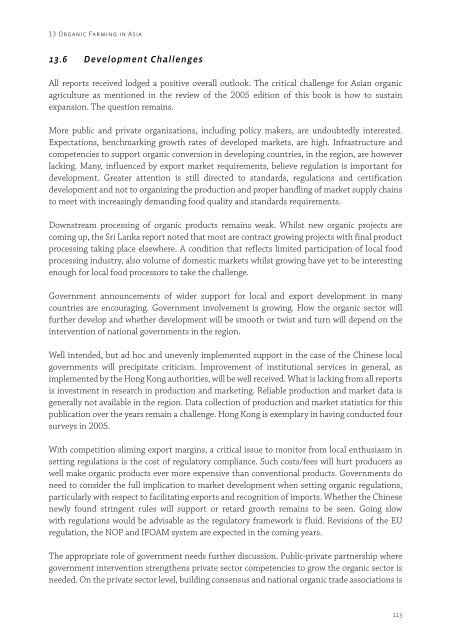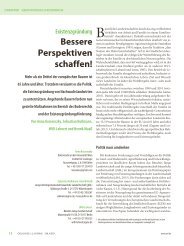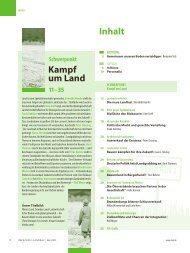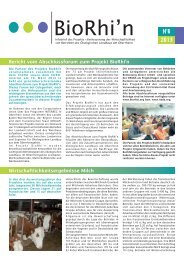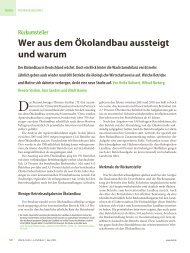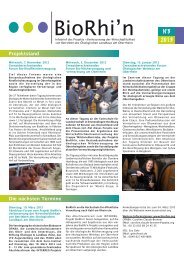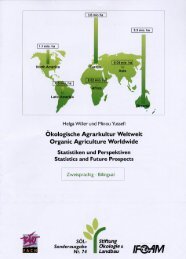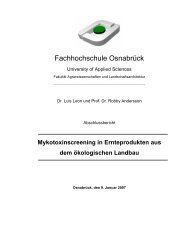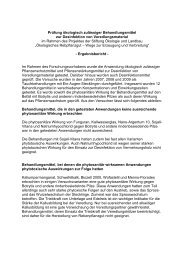the world of organic agriculture - Organic Eprints
the world of organic agriculture - Organic Eprints
the world of organic agriculture - Organic Eprints
You also want an ePaper? Increase the reach of your titles
YUMPU automatically turns print PDFs into web optimized ePapers that Google loves.
13 <strong>Organic</strong> Farming in Asia<br />
13.6 Development Challenges<br />
All reports received lodged a positive overall outlook. The critical challenge for Asian <strong>organic</strong><br />
<strong>agriculture</strong> as mentioned in <strong>the</strong> review <strong>of</strong> <strong>the</strong> 2005 edition <strong>of</strong> this book is how to sustain<br />
expansion. The question remains.<br />
More public and private organizations, including policy makers, are undoubtedly interested.<br />
Expectations, benchmarking growth rates <strong>of</strong> developed markets, are high. Infrastructure and<br />
competencies to support <strong>organic</strong> conversion in developing countries, in <strong>the</strong> region, are however<br />
lacking. Many, influenced by export market requirements, believe regulation is important for<br />
development. Greater attention is still directed to standards, regulations and certification<br />
development and not to organizing <strong>the</strong> production and proper handling <strong>of</strong> market supply chains<br />
to meet with increasingly demanding food quality and standards requirements.<br />
Downstream processing <strong>of</strong> <strong>organic</strong> products remains weak. Whilst new <strong>organic</strong> projects are<br />
coming up, <strong>the</strong> Sri Lanka report noted that most are contract growing projects with final product<br />
processing taking place elsewhere. A condition that reflects limited participation <strong>of</strong> local food<br />
processing industry, also volume <strong>of</strong> domestic markets whilst growing have yet to be interesting<br />
enough for local food processors to take <strong>the</strong> challenge.<br />
Government announcements <strong>of</strong> wider support for local and export development in many<br />
countries are encouraging. Government involvement is growing. How <strong>the</strong> <strong>organic</strong> sector will<br />
fur<strong>the</strong>r develop and whe<strong>the</strong>r development will be smooth or twist and turn will depend on <strong>the</strong><br />
intervention <strong>of</strong> national governments in <strong>the</strong> region.<br />
Well intended, but ad hoc and unevenly implemented support in <strong>the</strong> case <strong>of</strong> <strong>the</strong> Chinese local<br />
governments will precipitate criticism. Improvement <strong>of</strong> institutional services in general, as<br />
implemented by <strong>the</strong> Hong Kong authorities, will be well received. What is lacking from all reports<br />
is investment in research in production and marketing. Reliable production and market data is<br />
generally not available in <strong>the</strong> region. Data collection <strong>of</strong> production and market statistics for this<br />
publication over <strong>the</strong> years remain a challenge. Hong Kong is exemplary in having conducted four<br />
surveys in 2005.<br />
With competition sliming export margins, a critical issue to monitor from local enthusiasm in<br />
setting regulations is <strong>the</strong> cost <strong>of</strong> regulatory compliance. Such costs/fees will hurt producers as<br />
well make <strong>organic</strong> products ever more expensive than conventional products. Governments do<br />
need to consider <strong>the</strong> full implication to market development when setting <strong>organic</strong> regulations,<br />
particularly with respect to facilitating exports and recognition <strong>of</strong> imports. Whe<strong>the</strong>r <strong>the</strong> Chinese<br />
newly found stringent rules will support or retard growth remains to be seen. Going slow<br />
with regulations would be advisable as <strong>the</strong> regulatory framework is fluid. Revisions <strong>of</strong> <strong>the</strong> EU<br />
regulation, <strong>the</strong> NOP and IFOAM system are expected in <strong>the</strong> coming years.<br />
The appropriate role <strong>of</strong> government needs fur<strong>the</strong>r discussion. Public-private partnership where<br />
government intervention streng<strong>the</strong>ns private sector competencies to grow <strong>the</strong> <strong>organic</strong> sector is<br />
needed. On <strong>the</strong> private sector level, building consensus and national <strong>organic</strong> trade associations is<br />
113


